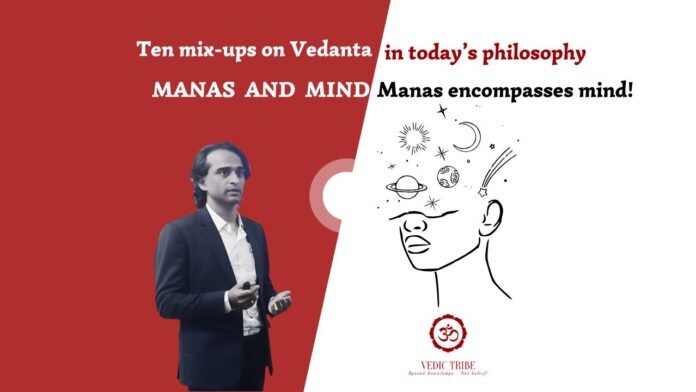Understanding Manas
In the previous article, we discussed why Sri Shankaracharya’s teachings should be called “Advaita” and not monism. In this article we will discuss how the term Manas is wider and quite different from the term Mind.
The term “mind” is often used interchangeably with the Sanskrit word “Manas.” However, this is a significant misnomer. While the two terms share some similarities, they diverge significantly in their philosophical implications.
Mind vs. Manas
What is Mind? In Western philosophy, the concept of “mind” is often associated with consciousness, thought, and emotion. It is often debated whether the mind is a physical or non-physical entity. Some philosophers argue that it is a product of brain activity, while others maintain that it is a non-material substance.
Physical / non physical: In “Cartesian dualism”, the mind is considered a non-physical reality whereas in “property dualism” mind is considered a property of the physical world. In Cartesian dualism, the mind is considered a non-physical entity, separate from the physical body. Rene Descartes famously argued that the mind is the crux of what it is to be human, and that it exists separately from the body.
What is Manas? In Vedanta, Manas is one of the four components of the antahkarana (inner instrument):
Chitta – memory shell
Buddi – intellect
Ahankara – self-awareness and
Manas – will or resolution.
Volition: In Vedanta Manas is the instrument of volition or intention. The antahkarana (with the said four ingredients) act as the inner instrument for Jeevatma, enabling it to experience the physical world. While Jeevatma is a non-physical being, antahkarana is purely physical. The antahkarana and the living bodies of all sentient beings are part of the physical existence.
Manas – a representative of Antahkarana:
In Vedanta, term “manas” is often used to represent the entirety of antahkarana. Specially in Bhagavad Gita, Lord Krishna uses the term Manas and never uses the term Antahkarana
Key Differences:
Physicality: While the Western concept of mind is often debated as physical or non-physical, Vedanta explicitly considers antahkarana as a physical instrument.
Function: In Vedanta, Manas is primarily concerned with volition, while the Western concept of mind encompasses a broader range of cognitive functions.
Relationship to the Soul: In Vedanta, Manas is an instrument of the individual soul, enabling it to interact with the material world. In western philosophy mind itself is soul or mind is simply brain’s function of the soulless body.
Key take aways for you:
Manas not mind: While studying Vedanta, remember that you are enquiring into the workings of entire Antahkarana which is a much deeper concept than the western idea of “mind”.
Study Darshanas: While studying Vedanta, also study other darshans (Samkhya & yoga) along with puranic expositions. This helps in understanding the central ideas of Vedanta literature.
In the next article, we will discuss the fourth mix-up – “Sacrifice and Yajna”.
Madhwesh K
Vedic Tribe

